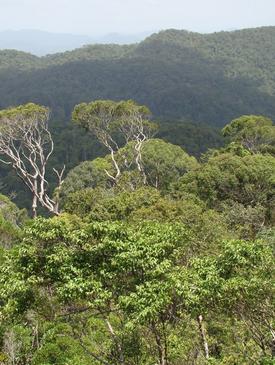Conference: Restoring Forests in Human Dominated Landscapes of the Wet Evergreen Region, South Asia
Summary
Tropical forests provide humanity with a wealth of globally important goods and services that are increasingly diminished as forests are converted for agriculture and other uses. South Asia was the first tropical region to experience large-scale land clearance of this type, with well documented damage to biodiversity and other forest values. In recent years, restoration efforts in South Asian forests have increasingly focused on native species, a priority of both smallholders and conservationists.
This ELTI conference brought together experts from top universities throughout South Asia and the globe to provide practicable scientific guidance and solutions for restoration of the wet evergreen forests of Sri Lanka and Southern India. Major topics included restoration of native forests, secondary forests and biodiversity conservation, community forests and NTFPs, and land tenure and the socio-economics of restoration. Individuals from concerned government agencies, NGOs, research institutions, and the general public attended.
Content
Opening Remarks: Siril Wijesundara / Peradeniya Royal Botanic Garden
Panel 1. Restoration pathways of native forests
Moderator: Peter Ashton / Harvard University
-
Restoration of invasive grasslands in the montane highlands
- David Burslem / University of Aberden and Thilanka A. Gunaratne / University of Peradeniya
-
Relay floristics as a model for restoration in pine plantations
- Mark Ashton / Yale University and Savithri Gunatilleke / University of Peradeniya
-
Tropical forest restoration for wildlife habitat in Mudumalai Game Reserve
- Raman Sukumar / Indian Institute of Science
-
The use of native pioneers as facilitators of secondary succession
- Uromi Goodale / University of California, San Diego
Panel 2. Community forests and non-timber forest products
Moderator: Nimal Gunatilleke / University of Peradeniya
-
The ecology and management of NTFPs in the Western Ghats
- Kamal Bawa / University of Massachusetts / ATREE
-
Use and cultivation of selected non-timber forest species in degraded forest lands of Sri Lanka
- Kushan Tennakoon / University of Brunei Darrussalam and Nimal Gunatilleke / University of Peradeniya
-
Communities, rights, and conservation: The role of indigenous community conserved areas
- Ashish Kothari / ICCA Consortium
-
Forest policies and its impacts on NTFPs and livelihoods
- Nitin D. Rai / ATREE
Panel 3. Second growth forest and biodiversity conservation
Moderator: Eben Goodale / University of California, San Diego
-
Sustaining biodiversity in the fragmented landscape in the Western Ghats
- M.O. Anand / Nature Conservation Foundation
-
The ecology and management of sacred groves
- U.M. Chandrashekara / ATREE - Ashoka Trust for Research in Ecology and Environment
-
Mixed-species flocks of birds inside and outside of protected reserves in Sri Lanka and southern India
- Dr. Eben Goodale / University of California, San Diego
-
Wildlife and amphibian biogeography, restoration, and fragmentaiton of forests of SW Sri Lanka
- Madhava Meegaskumbura / University of Peradeniya
Panel 4. Land rights, tenure and the socio-economics of restoration
Moderator: David Neidel / Environmental Leadership & Training Initiative
-
Grassland afforestation and restoration in Toda lands in the Nilgiris: A historical sociology of colonial and post-independence land policies; contemporary ecological restoration policy and pastoral opinion on restorative projects
- Siddhartha Krishnan / ATREE Ashoka Trust for Research in Environment and Ecology
-
The economics of biodiversity in plantation systems
- K.N. Ninan / Institute for Social and Economic Change
-
Cultural drivers of reforestation
- Shonil Bhagwat / University of Oxford
-
Participatory approaches to restore natural vegetation in Sri Lanka - success and failures
- Anura Sathurusinghe / Sri Lanka Forest Department
Closing Remarks and Acknowledgements: Mark Ashton / Yale University


